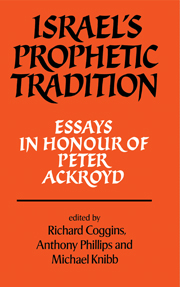Book contents
- Frontmatter
- Contents
- Preface
- Biographical note
- Abbreviations
- Note
- Prophecy in the ancient Near East
- The origins of prophecy in Israel
- Three classical prophets: Amos, Hosea and Micah
- The Isaiah tradition
- An alternative prophetic tradition?
- Visionary experience in Jeremiah
- The Ezekiel tradition: prophecy in a time of crisis
- The prophets of the restoration
- Prophecy and the emergence of the Jewish apocalypses
- Prophecy and wisdom
- Prophecy and the cult
- Prophecy and law
- A change of emphasis in the study of the prophets
- Martin Buber and the interpretation of the prophets
- Index of Biblical References
Prophecy and the cult
Published online by Cambridge University Press: 09 January 2010
- Frontmatter
- Contents
- Preface
- Biographical note
- Abbreviations
- Note
- Prophecy in the ancient Near East
- The origins of prophecy in Israel
- Three classical prophets: Amos, Hosea and Micah
- The Isaiah tradition
- An alternative prophetic tradition?
- Visionary experience in Jeremiah
- The Ezekiel tradition: prophecy in a time of crisis
- The prophets of the restoration
- Prophecy and the emergence of the Jewish apocalypses
- Prophecy and wisdom
- Prophecy and the cult
- Prophecy and law
- A change of emphasis in the study of the prophets
- Martin Buber and the interpretation of the prophets
- Index of Biblical References
Summary
The relationship of prophecy to the cult in ancient Israel may be viewed under three headings: (1) activity within the cult, (2) activity independent and often critical of the cult, and (3) utterances and compositions that, while not necessarily belonging to cultic occasions, reflect and echo, but often transform, liturgical language and themes. Here I propose, after a brief sketch of headings (1) and (2), to concentrate on some problems under heading (3), by an examination of the language and themes that link Isa. 33 to other prophetic passages (especially elsewhere in Isaiah) and to the Psalms. This will involve a re-examination of the notion of ‘prophetic liturgy’ and the suggestion that some themes, which have come to be regarded as looking forward to late apocalyptic eschatology, may rather be echoes of ancient rituals. It is a pleasure to offer Peter Ackroyd a development of some ideas first ventilated in his seminar, in which I have learned so much.
Activity within the cult
By ‘cult’ I understand primarily the liturgical and ritual activities contemporary with the prophets, but with due awareness that, whatever the original Sitz im Leben of the prophetic utterances, the texts as they stand also reflect their after-life and the use of them in other kinds of cult and devotional activity, which may have left its marks, as well as bequeathing to us a unified context in which we read the Old Testament, as Childs (1979) has so usefully reminded us. ‘Prophecy’ I am inclined to understand broadly (not, therefore, restricting the basis to particular characteristic terms) as utterance arising from the belief that someone has a communication from God that must be passed on.
- Type
- Chapter
- Information
- Israel's Prophetic TraditionEssays in Honour of Peter R. Ackroyd, pp. 200 - 216Publisher: Cambridge University PressPrint publication year: 1982



